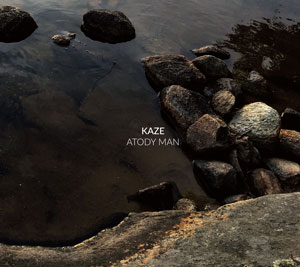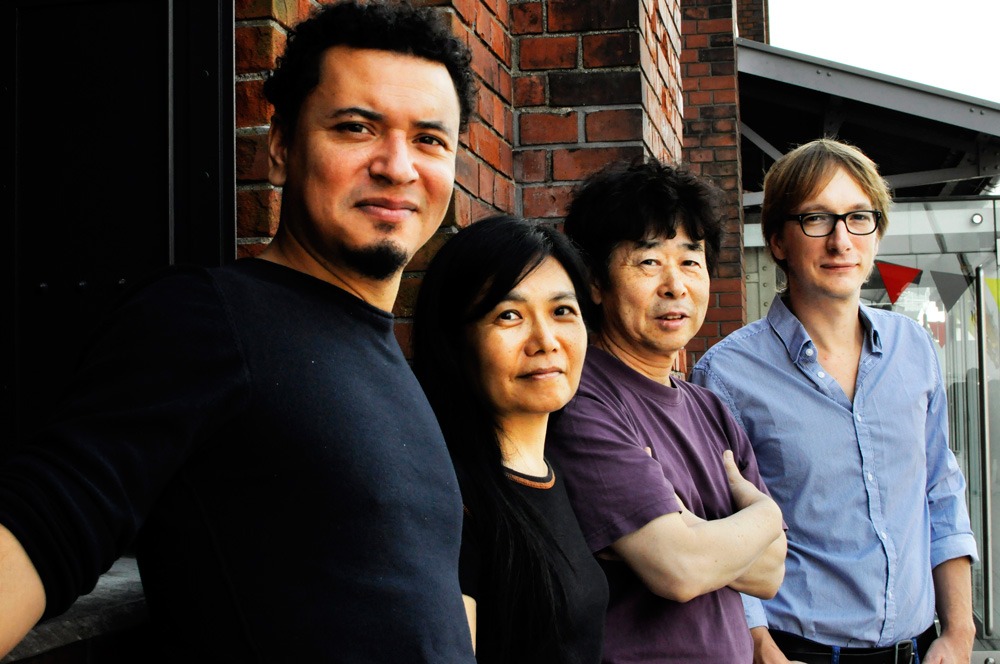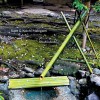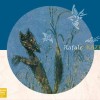KAZE |

|
BUY / ACHETER |
| NATSUKI TAMURA : TRUMPET CHRISTIAN PRUVOST : TRUMPET SATOKO FUJII : PIANO PETER ORINS : DRUMS |
On Atody Man, Kaze, the cooperative quartet featuring Japanese pianist Satoko Fujii and trumpeter Natsuki Tamura, French trumpeter Christian Pruvost and drummer Peter Orins, continues one of the most captivating ongoing musical conversations in jazz. As they enter their eighth year together, they find themselves enjoying a group rapport that few other bands share. Using minimal yet distinctive compositional frameworks from each band member, they engage in deep musical exchanges full of surprise and wit. It’s almost as if they were talking to one another without words.
“Yes, we do talk in music,” Fujii says of the quartet. “Natsuki and I cannot speak French and Peter and Christian don’t speak Japanese, but we can talk in music. This always amazes me!”
“The compositions have always been an excuse for the improvisation,” says drummer Orins. “We are very different in the way we write music, but I think that we compose to create a place to communicate with each other.”
Their musical communication is rich with a huge vocabulary of sounds and historical and stylistic references, all freely called upon and used in stunning dialogues among master musicians. For instance, the trumpeters playfully spar to comic effect on Fujii’s “Moving” but begin Orins’s “Hypnotique Sympathie” with carefully controlled and modulated long tones that establish a somber ritualistic atmosphere. (Pruvost is heard on the right, Tamura on the left throughout the album.) Fujii is equally mercurial, waxing Chopinesque toward the end of “Hypnotique Sympathie,” then playing spare, lyrical lines on “Inspiration 2,” and rhythmically engaged in a percussive duet with Orins on “Moving.” Orins is a constant source of surprise and inspiration throughout, orchestrating textures, prodding and driving, or adding sparse rhythms as the interplay among his bandmates requires. On this album, they have broadened the music with more use of space and silence than on previous discs.
The collective improvisations display some of the deepest communication among the quartet on the album. They seem to finish each other’s thought’s on “Meta-Blizzard,” in a richly textured four-way conversation that veers from abstract sound to melodic phrases and from languid tempo to high energy with graceful ease. The quiet “Atody Man” (Malagasy for “egg man”) features a hushed but intense conversation among all four players. The concentrated listening, familiarity bred of several years of working together, and the seamless use of both conventional and extended techniques give all of Kaze’s music an exhilarating sense of freedom.
Over the course of three previous quartet releases, plus June (HeliX 2017), an album by an extended sextet version called Trouble Kaze, and a guest appearance with Fujii’s Orchestra Tokyo’s Peace (Libra 2016), Kaze continues to amaze listeners with evolving and emotionally deeper music. “I think we all feel more and more free the longer we play together,” says Orins, “We always push our own limits, and play more and more in the present.”
“I have to say, I have so much fun playing compositions by Peter, Christian, and Natuski, which are totally different from mine,” says Fujii. “This group inspires me so much.”
Sur Atody Man, le quartet collectif franco-japonais Kaze poursuit l’une des conversations musicales les plus captivantes du jazz. Après huit années d’existence, les relations au sein du groupe sont plus fortes que jamais. En usant de l’écriture musicale, minimale mais distinctive, de chaque membre du groupe, ils s’engagent dans des échanges profonds pleins de surprise et d’esprit. C’est presque comme s’ils se parlaient sans mots.
“Oui, nous parlons en musique”, dit Satoko Fujii du quartet. “Natsuki et moi ne pouvons pas parler français et Peter et Christian ne parlent pas japonais, mais nous pouvons parler en musique. Cela m’étonne toujours !”
“Les compositions ont toujours été une excuse pour l’improvisation”, explique le batteur Peter Orins. “Nous sommes très différents dans la façon dont nous écrivons de la musique, mais je pense que nous composons pour créer un lieu de communication entre nous.”
Leur conversation musicale est riche d’un vaste vocabulaire de sons et de références historiques et stylistiques, tous librement sollicités et utilisés dans de superbes dialogues entre des maîtres-musiciens. Par exemple, les trompettes jouent de manière espiègle sur “Moving” mais commencent “Hypnotique Sympathie” avec des sons longs soigneusement contrôlés et modulés qui établissent une atmosphère rituelle sombre. (On entend Christian Pruvost sur la droite, Natsuki Tamura sur la gauche tout au long de l’album.) Satoko Fujii est tout aussi imprévisible, avec un penchant chopinesque vers la fin de “Hypnotique Sympathie”, puis jouant des lignes lyriques sur “Inspiration 2”, et rythmiquement engagé en duo avec le batteur dans “Moving”. Peter Orins est une source constante de surprise et d’inspiration, orchestrant les textures, incitant et dirigeant, ou ajoutant des rythmes clairsemés en interaction avec ses collègues. Sur cet album, plus que sur les précédents, ils ont intégré espace et silence à leur musique.
Les improvisations collectives sont profondes. Elles semblent compléter les pensées de chacun sur “Meta-Blizzard”, dans une conversation à quatre voix richement texturée qui passe du son abstrait aux phrases mélodiques et du tempo langoureux à la haute énergie avec grâce. Le calme “Atody Man” (malgache pour “egg man”) propose un échange feutré mais intense entre les quatre joueurs. L’écoute concentrée, la familiarité engendrée par plusieurs années de travail en commun et l’utilisation transparente des techniques conventionnelles et étendues donnent à toute la musique de Kaze un sentiment exaltant de liberté.
Après 3 albums en quartet, le disque June (HeliX 2017), où le quartet est complété par Sophie Agnel et Didier Lasserre (Trouble Kaze), et une apparition dans Peace du Satoko Fujii Orchestra Tokyo (Libra 2016), Kaze continue d’émerveiller les auditeurs avec une musique touchante, profonde et en perpétuel changement. “Je pense que nous nous sentons tous de plus en plus libres à force de jouer ensemble”, dit Orins, “Nous repoussons toujours nos propres limites, et jouons de plus en plus dans l’instant présent.”
“Je dois dire que je m’amuse tellement à jouer les compositions de Peter, Christian et Natuski, qui sont totalement différentes des miennes”, dit Fujii. “Ce groupe m’inspire tellement.”
Recorded on June 24 – 2017 at Firehouse 12 – Warehouse Studio (New Haven – USA) by Nick Lloyd.
Mix and Edit by Peter Orins. CD-Master by Philippe Tessier du Cros (Paris – F).
Photo and graphic design by Peter Orins.
Produced by Circum-Disc and Libra-Records.
Available in CD (digifile cover), FLAC HD (96kHz/24bits) and mp3
See also :

| ||

| | |














